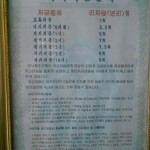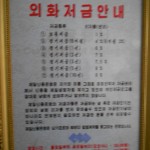According to to the Joongang Ilbo:
It was the end of March, about 20 days after the United Nations Security Council adopted resolution No. 2094 punishing North Korea for its third nuclear weapons test with new sanctions. At a newly built, modern-style train station in this southeastern Chinese city bordering Macau, three North Koreans in black suits with badges bearing the portrait of former leader Kim Jong-il appeared in the early evening. From the station they carried a large and obviously heavy gunny sack to a sedan parked about 30 meters (0.18 miles) away. They all got in and pulled away.
Two hours later, the sedan arrived at a high-rise building in Menggang district, Guangdong Province. Inside was an office of a private loan shark.
They entered the office on the seventh floor. One of the visitors, a middle-aged North Korean who spoke fluent Cantonese, greeted a Chinese man whom he called “Russelle.”
The North Korean dragged the sack to Russelle and opened it. Inside were bundles of U.S. banknotes. Russelle handed them to his underling and ordered him to count them with a banknote-counting machine.
After the total was confirmed, the North Korean withdrew a piece of paper with bank account numbers written on it. As in a thriller movie, Russelle began electronic banking transactions on a computer. He divvied up the total amount of cash among the accounts, sending set amounts to each. The total amount transferred: $2 million.
For helping in the money-laundering, Russelle was to receive 15 percent of the $2 million. In more urgent situations, his commission rises to 30 percent.
Several sources familiar with loan sharks in Guangzhou described these scenes to the JoongAng Sunday. The North Koreans were allegedly officials working for the Kwangson Banking Group, an affiliate of North Korea’s state-run Foreign Trade Bank, the country’s primary foreign exchange bank. The North Korean who led the shady business with Russelle was Kim Kwi-chol, head of the Kwangson branch in Zhuhai.
North Korea has, sources say, conducted illicit activities like money-laundering through Kwangson’s branches in Zhuhai and Dandong, and it is playing a role for Pyongyang similar to that of Macau’s Banco Delta Asia’s after 2005, when sanctions brought its business to a halt.
According to “Recent Financial Activities of North Korea,” a report by Kim Gwang-jin, a defector-turned-researcher at the Institute for National Security Strategy under the National Intelligence Service, Kwangson Bank is in charge of slush funds used by North Korean leader Kim Jong-un, money-laundering and remittances from banks sanctioned by the U.S. or UN Security Council.
The U.S. Treasury Department froze U.S. assets of the Kwangson Banking Corporation and prohibited U.S. citizens from doing business with the group in August 2009, accusing it of aiding the proliferation of weapons of mass destruction. Last March, it said the Foreign Trade Bank was covered by executive order No. 13382, freezing all of its U.S. assets and prohibiting U.S. financial institutions from doing business with it. In May, the Bank of China said it would stop all dealings with it.
But an expert in international finance told the JoongAng Sunday in April, “The sanctions taken by the U.S. Treasury Department against North Korea has no effect in regard to the Foreign Trade Bank.”
The head of the Zhuhai branch of Kwangson, Kim Kwi-chol, was allegedy born in Hoeyang, Kangwon Province in the North, on Nov. 19, 1955. In April 1984, he started work at the Foreign Trade Bank of North Korea and worked in a branch of the bank in China in the late 1990s, and in Libya during the mid-2000s. He moved to the branch in Zhuhai on April 13, 2003.
Sources said Kim is in charge of delivering slush funds to Kim Jong-un and other members of his elite inner circle. He’s also in charge of some large-scale money-laundering, taking advantage of Zhuhai bordering Macau. He is fluent in Cantonese and Mandarin with working experience in China for more than 10 years as a financial expert. He is allegedly living with his wife Pak Yong-hui, 57, in Zhuhai.
“He is a person who is always vigilant,” researcher Kim said.
An official investigating North Korea’s businesses in Zhuhai said, “We have recently confirmed that there are five workers and Kim Kwi-chol in the branch [in Zhuhai]. The amount of money the branch is dealing with is about $3 billion won a year, which is a bit less than that of the branch in Dandong in Liaoning Province.”
“Since Banco Delta Asia was frozen in 2005, North Korea’s funds are going through Guangzhou, Shenzhen and Zhuhai,” an official in Macau said on the condition of anonymity.
On April 30, a JoongAng Sunday reporter visited a residential complex in Zhuhai, where several sources alleged the Kwangson Banking Group’s Zhuhai branch was located. The complex was composed of three separate apartment buildings with a front gate that required a security code for entrance. The JoongAng Sunday reporter sneaked into the complex when some residents punched in their codes.
However, when the reporter reached the office of Kwangson, there was no sign on its door. Although the reporter pressed the doorbell, no one answered. A security guard at the building said: “I have not heard of Kwangson Banking Group.”
Sources said the office kept as low a profile as possible. A resident of the complex who has seen the office said, “It’s not that large with several workers at the desks looking at financial terminals. The atmosphere was bleak.”
“Recently, the Hong Kong financial authorities launched a probe into Kwangson bank’s branch in Zhuhai, on suspicion of starting a shell company in Hong Kong under a fake name and working on money-laundering,” an official at a corporate intelligence service in Hong Kong said.
The official said the company was registered to a woman who doesn’t live in Hong Kong but in mainland China. Starting several years ago, more than $100 billion has been remitted to her accounts, raising suspicions she could be connected to the Kwansgon branch in Zhuhai.
A similar front company, Leader (Hong Kong) International Trading Company, was sanctioned by the U.S. Treasury Department in January.
“Since the incident with Banco Delta Asia, most North Koreans staying in Macau left due to tightened supervision of money-laundering,” a source said. “However, they still had to keep in touch with their clients and partners in Macau, so they chose Zhuhai, bordering Macau, as an alternative.”
Currently, North Korea’s two major state-run banks are its Central Bank and the Foreign Trade Bank. The Foreign Trade Bank is in charge of foreign currency.
Although the Kwangson Banking Group officially belongs to the Foreign Trade Bank, in fact, it is a special organization that deals with foreign currency that is dubbed the “revolution fund.” The bank’s other name is Bureau 711.
“Kwangson Banking Group is a special financial organization in charge of slush funds of the Kim family under the direct control of Kim Kyung-hui, younger sister of the late leader Kim Jong-il,” Kim Gwang-jin said. “The group’s branch in Dandong was founded in September 2002 and another one in Macau was moved to Zhuhai after the problems with Banco Delta Asia starting in 2005.”
“After Banco Delta Asia, the foreign currency business of normal North Korean banks was paralyzed, but the Kwangson Banking Group has led the money-laundering business with the full support of the North Korean elite.”
Kim said there are three financial experts specializing in foreign currency in North Korea – Ri Tong-rim, president of the Kwangson Banking Group, Kim Kwi-chol, head of the Zhuhai branch and Ri Il-su, head of the Dandong branch.
Ri, the 57-year-old executive, was born in Songgan County, Chagang Province. He started as a manager at the Foreign Trade Bank in 1980 and became president of the 711 Bureau, the Kwangson bank, in 2004.
“When the Soviet Union collapsed, he collaborated with the Russian mafias and successfully withdrew $4.5 million from a bank in the USSR,” Kim said.
Ri Il-su, head of the bank’s Dandong branch, is assumed to be in his mid-50s. He was a vice president of the Foreign Trade Bank’s branch in Zhuhai and vice president of the 711 Bureau in the mid-1990s.
In June 2006, he signed an agreement with the China Construction Bank’s branch in Dandong over founding a joint bank in a border region between China and North Korea. The joint bank is in charge of foreign currency in three provinces in northeastern China.
“Under the agreement, if the Dandong branch remits money to a local bank in the three provinces first, then the Chinese bank resends the money to another bank in China or a third country for money-laundering,” Kim said. “Although the Bank of China or other major banks ban North Koreans opening accounts, other small-scale banks allow it.”
The Kwangson bank reportedly has a branch in Shenzhen, southern China, but its head is unknown.
“In the financial sector in Hong Kong, it’s said that Kwangson bank’s Zhuhai branch is earning big profits through gold investment, stock transactions and foreign exchange,” an official at a croporate intelligence service in Hong Kong, said. “A rumor says that when North Korea shelled the South Korean island of Yeonpyeong in November 2010, the branch bought a bunch of stocks of South Korean companies whose prices drastically dropped because of the shelling and made huge profits.”
“It is really urgent to stop the illicit activities of these North Koreans in China,” a South Korean government official said. “It is actually impossible to impose effective sanctions against North Korea without the full help of the Chinese government.”
Read the full story here:
North money laundering done in Guangdong
Joongang Ilbo
Ahn Sung-kyoo
2013-6-5


